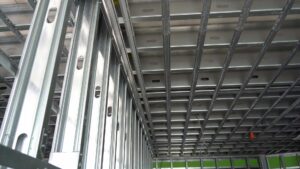Mold can be a huge problem for new and existing structures, causing structural damage and health problems for building occupants. Expert sources point to cold-formed steel (CFS) framing as a solution to combat mold.
Mold can be a huge problem in new and existing structures. It can cause structural damage, health problems and even death. Can anything be done to mitigate the appearance of mold in a structure?
Yes. A number of expert sources say that owners and builders should consider using cold-formed steel (CFS) framing for any new or renovation project to help prevent mold intrusion and keep occupants safe.
Steel Can Mitigate Mold Growth
Construction expert Fred Soward, founder of Allstate Interiors of NY, explains how cold-formed steel (CFS) framing can help mitigate mold growth in building projects.
“Homes constructed with steel framing are at a lower risk of mold growth than homes built with wood framing,” says Soward. “In addition, steel framing is more robust and durable than wood, making it ideal for areas that experience high winds or earthquakes.”
Building materials that remain wet for more than 48 hours, accompanied by moderate indoor temperatures, create ideal conditions for mold to proliferate. The materials can become moist through leaking pipes or roofs, rainwater seepage, flooding, uncontrolled high relative humidity and construction practices that don’t properly protect building materials from the elements.
While water intrusion may be easily identified on some interior surfaces, other building materials, such as wood framing hidden behind finish materials, may harbor undetected mold. Eventually, mold can eat away at building materials, affecting their look and smell. It can rot wood members and impact the structural integrity of wood-framed buildings.
The Cost of Mold
It is important to use anti-mold materials, like cold-formed steel (CFS), at the onset of a project. If a specialist is required to remediate mold after a building is constructed, it can be costly.
Most mold remediation specialists charge up to $28.33 per square foot, depending on the colony’s location and its severity, according to Jane Purnell at LawnStarter.
A mold colony that has taken over a 50-square-foot area will cost most homeowners $1,417, while a 400-square-foot infestation can cost up to $11,332.
Steel is Part of an Anti-Mold Solution

Steel’s durability substantially eliminates the expansion and contraction of construction materials around windows and doors where leaks can occur.
Ventilation is efficiently built into the design of structures framed with steel. Also,energy-efficiency is maintained or increased due to steel’s inorganic properties, according to Walls and Ceilings.
CFS framing can combat slow destruction caused by mold because steel is not organic matter. That makes it an unappealing surface for mold to establish itself and grow.
Moisture does not get into steel studs. Steel’s durability substantially eliminates the expansion and contraction of construction materials around windows and doors where leaks can occur.
“Since cold-formed steel is 100% compatible with standard building materials, steel is a perfect marriage for reducing the opportunity for mold to grow,” says Larry Williams, executive director of the Steel Framing Industry Association.
“In addition to being non-combustible and prescriptively designed to withstand extreme weather conditions such as high winds and earthquakes, cold-formed steel’s galvanized zinc coating can protect even a waterfront structure against corrosion for hundreds of years,” Williams says.
Post time: Mar-06-2023


